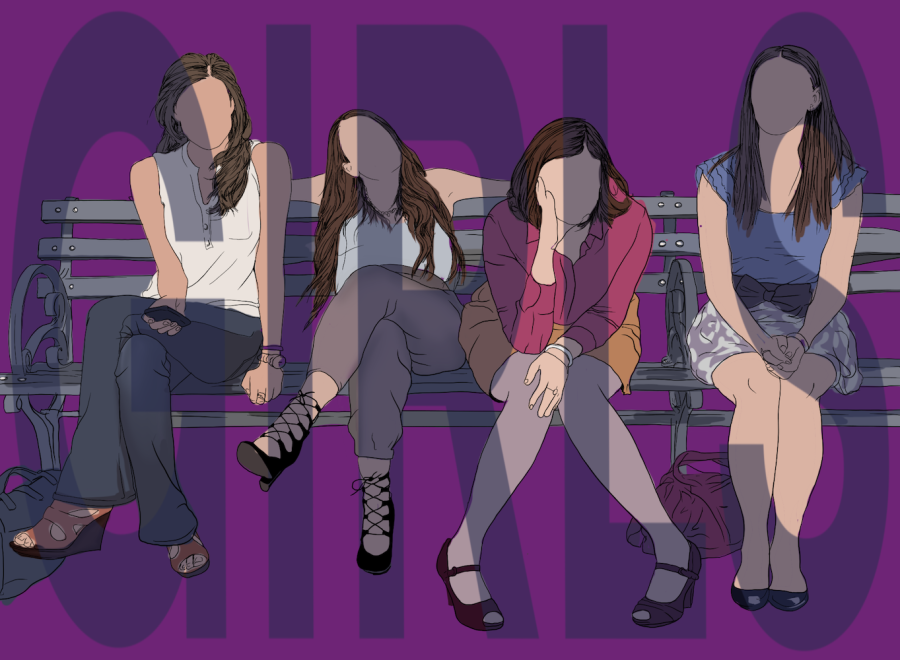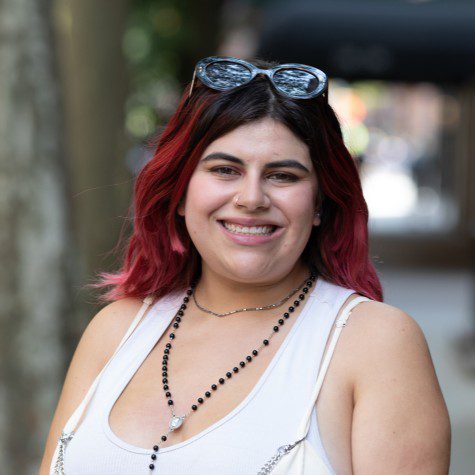Revisiting ‘Girls’: A story about friendship and deeply flawed people
Lena Dunham’s cringeworthy characters and dysfunctional friendships have found a new audience among Gen Z, 11 years after the show’s debut.
The renaissance of HBO’s “Girls.” (Illustration by Aaliya Luthra)
April 17, 2023
Premiering 11 years ago on April 15, 2012, the HBO show “Girls” — produced by Judd Apatow and controversial writer-director Lena Dunham — has cemented itself as a staple within a new generation of watchers.
The show, which ran for six seasons between 2012 and 2017, has found a new audience after clips from the show began making the rounds on TikTok, with the tag “girls hbo,” garnering over 202 billion views on the site. The renaissance of “Girls” has not gone unnoticed among its original millennial audience. A recent New York Times article explores what revisiting the show means to viewers, some of whom are now well into their 30s.
While the show focuses on the deeply flawed character of Hannah Horvath (Lena Dunham) and her disordered relationships with all those around her, it remains one of the few shows that explores women’s friendships through adulthood. While most New York women aspire to live out the fantasy of “Sex and the City,” “Girls” presents a view of dysfunction and cynicism that aligns with Gen Z’s humor. The show is a time capsule into the gentrification of Brooklyn that many in Gen Z benefit from, the rise of Adam Driver’s career, and Bushwick raves that are all too familiar to many of us on campus.
“Girls” also focuses on the friendship and lives of Hannah and her college friends Marnie (Allison Williams) and Jessa (Jemima Kirke), and Jessa’s cousin Shoshanna (Zosia Mame). The show is a reflection on the strengths and weaknesses of female friendships after college. Often self-centered, the characters struggle through finding their identity and place in the city, offering a refreshing view that contrasts the highly-aestheticized image curated today by influencers on social media. The rawness and outright awfulness of the characters as they fail to recognize their immense financial, class and racial privilege, is what drives the viewer to keep on watching.
Throughout the show, Hannah is described as a narcissist, and often revels in a sense of superiority as she compares herself to her friends. She often victimizes herself and disregards others’ issues, playing into this role from the start as she complains about how unfair her life is when her parents decide to cut her off financially.
Marnie, Hannah’s best friend and roommate at the start of the show, cycles through endless jobs, from art gallery worker to indie-folk musician. Portrayed as the friend who is always in relationships, she’s seen as the codependent type. Meanwhile, Jessa is a laid-back character who struggles with substance abuse and instability, but always seems to have things go her way. From stealing Hannah’s on-again, off-again boyfriend Adam (Adam Driver) to marrying a rich guy after a short fling, Jessa’s luck keeps her afloat despite her issues. Shoshanna, who begins the series as an innocent NYU student, is the youngest in the crowd, yet becomes the only one to outgrow the group’s childish behaviors.
Though Hannah’s cringeworthy behavior is endlessly entertaining — she writes an article about being on coke and has sex with Jessa’s 19-year-old step-brother — the show’s reflections on being a woman in your twenties are what keep it relevant over a decade later. Not all will make the same mistakes as Hannah, but it is comforting to see a portrayal of a woman who has a few good moments alongside many terrible ones.
Despite the constant fighting and narcissistic behavior, “Girls” speaks to the importance of friendship. The show demonstrates the importance of being able to rely on a friend and turn to someone who can support you through your best times — such as Marnie helping raise Hannah’s baby — and understanding you even in your lowest moments — like Hannah supporting Jessa after her divorce. The group proves how crucial female friendships are for women transitioning into adulthood, even if they’re not meant to last forever.
While it is unclear if Dunham is self-aware of her characters’ flaws or if she is just playing an exaggerated version of herself, “Girls” proves there is an audience for female-centered shows where the characters don’t necessarily have to be likable or perfect.
The group often fails to see the seriousness of their actions, but are sometimes called out by those around them, such as Ray (Alex Karpovsky), Hannah’s boss who doubles as Marnie’s and Shoshana’s love interest. The 30-year-old Brooklyn grump contrasts the twenty-something’s youthful hopefulness with his complaints about the millennial gentrifiers. Despite being involved in relationship drama, Ray runs his own cafe to sustain himself, unlike the freeloading main cast. As gentrification takes over his neighborhood, he grows resentful about the trendy coffee shops that affect his local business, and later becomes part of the city council in an attempt to make things better for his community. By the last season, he is one of the few who outgrows the group, falling for Shoshanna’s boss, Abigail (Aidy Bryan), instead of any of the main cast.
Adam Driver’s stellar performance as one of the main romantic interests is not only compelling, but also shows the potential that Driver has proven in later roles. Starting off as a side character, Hannah’s obsessed boyfriend, Driver comes into his own throughout the show. From unemployed loafer to Broadway actor, Adam shows his range off and on stage throughout he and Hannah’s dysfunctional relationship. Driver is not the only recognizable actor that you’ll enjoy watching throughout the show, as Donald Glover, another NYU alum, makes a guest appearance as Hannah’s token Black Republican boyfriend. Gillian Jacobs guests as Adam’s infuriating artist girlfriend, and even Maude Apatow,“Euphoria” actress and director Judd Apatow’s daughter, guests in a couple of episodes as one of Hannah’s students.
While some of the jokes have aged poorly, like most of Dunham’s off-screen commentary these days, the show has proven to be ahead of its time. Fostering a space in television for women to be themselves — even if that is their worst version — “Girls” is as relevant today as it was a decade ago. If not for all the stars and badly aged jokes, watch the show for yourself, because there’s nothing more comforting than being able to look back and know that you could be screwing up worse.
Watch “Girls” streaming on HBO.
Contact Natalia Palacino at [email protected].

























































































































































